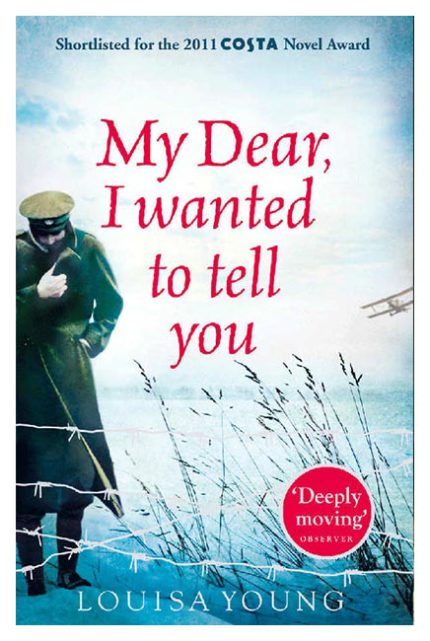My Dear I Wanted To Tell You
Richard & Judy Bookclub Choice 2012 / Waterstone’s ‘This Week’s Must Read’ / BBC Radio 2 Book Club choice / Shortlisted for the Wellcome Prize, the Galaxy Book of the Year, and the Costa Novel of the Year. Winner of the Galaxy Audiobook of the Year.
While Riley Purefoy and Peter Locke fight for their country, their survival and their sanity in the trenches of Flanders, Nadine Waveney, Julia Locke and Rose Locke do what they can at home. Beautiful Julia and gentle, eccentric Peter are married: every day Julia prepares for her beloved husband’s return. Nadine and Riley, only eighteen when the war starts, and with problems of their own already, want above all to make promises – but how can they when their future is completely out of their hands? And Rose? Well, what did happen to the traditionally brought-up women who lost all hope of marriage, because all the young men are dead?
‘My Dear I Wanted to Tell You’ is a big First World War novel, moving between Ypres, Amiens, London, Paris, Lancashire and Kent to tell of the experiences of women left at home as much as those of men in the trenches. It is the first of a series observing – through the descendents of Peter, Julia, Riley, Nadine, Rose and others – ways in which the experiences of that massively traumatic period and its aftermath shaped the following generations: all of us who grew up in the twentieth century.The title comes from a standard letter which was provided to soldiers who were wounded and admitted to hospital.
Powerful, sometimes shocking, boldly conceived, and irradiated by anger and pity
Sunday Times
Divine
The Times
Compelling and deeply moving
the Observer
Palpable, frightening, inspiring and painful. there are echoes here of Rebecca West… the core of the book is a love story built on rich strange details of the first world war
Guardian
Unmissable
Marie Claire
Birdsong for the new millennium
The Times
Weaves heartbreakingly painful irony, heroic sacrifice, human weakness, vanity, tragedy and the purest of loves – you’ll be left sobbing and grasping on to any hope…
Easy Living
This is the finest Great War novel since Susan Hill’s Strange Meeting… (it) encompasses themes of shifting perceptions of class; of the enduring, insistent consolation of art; of incorrigible wiliness; of unflinching duty and endurance; of the need to maintain a sense of identity when everything militates against its, and of selfless generosity, optimism and intense passion. Her research is meticulous, sometimes harrowing. The atmosphere she creates is often appalling, always compelling and her narrative drive is powerful enough to keep you up all night.
From the Readers:
Independent on Sunday
She has caught the ethos of the first world war extraordinarily well: the vast gap between the unspeakable horror of the trenches, and the drudgery overlaid by the chronic anxiety of the people left at home. Also the vast conspiracy of silence that was preserved by those fighting to protect the people they were fighting for. Young also writes very well and convincingly about that well-worn subject love, making it fresh and real and alive. All in all, this novel is a triumph.
Elizabeth Jane Howard
My Dear I Wanted To Tell You is one of those books that doesn’t leave you, and probably never will. So deep was the place it touched in my heart, that I wanted to keep the book itself close by; as if I could comfort each character and keep them tightly held. Many writers have set out describe war’s dark, lingering shadow, though few have truly succeeded. In this story of lives torn apart by the horror of the Great War, where even the soul struggles to rise amid the detritus of battle, Louisa Young proves herself to be one of those writers, and she has told this story very, very well.
Jacqueline Winspear
